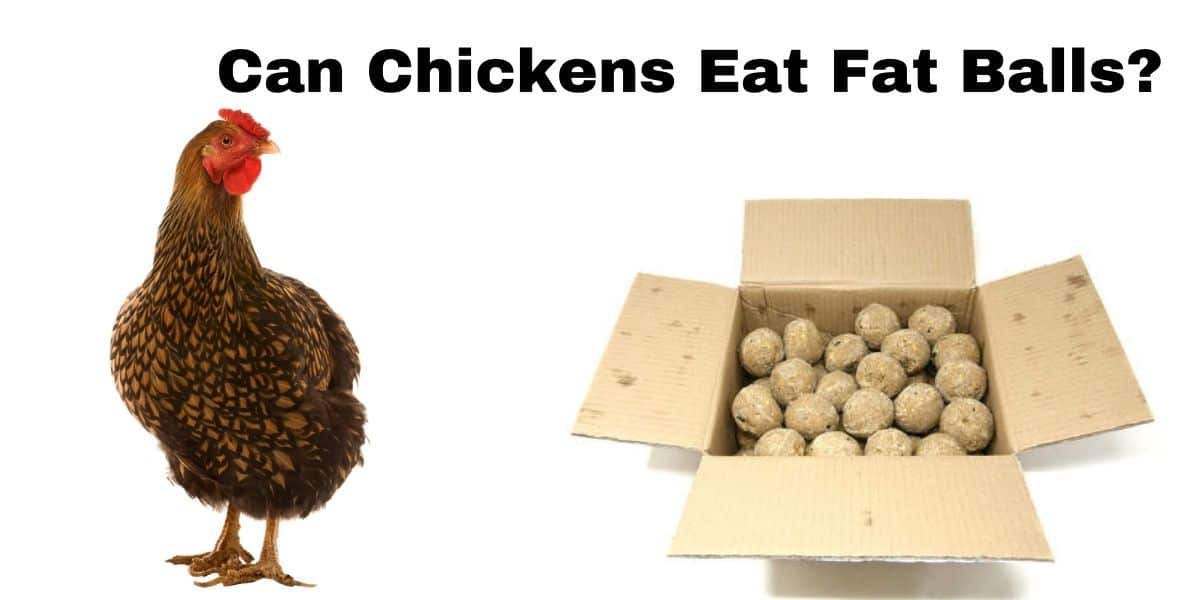If you are wondering whether your chickens can eat the traditional fat ball treats that are fed to birds and poultry, the answer is yes, but as with all matters of a hens diet, moderation is key!
Table of Contents
What are fat balls?
Fat balls like Feldy High Energy Chicken Pecker Balls are a high-energy treat for hens that not only provide food, but also mental stimulation and entertainment. These suet balls are left directly in the coop for the hens to peck at or placed in a fat ball feeder.
These food and wellbeing supplements are made from white fat or suet that have had a range of cereal ingredients, dietary supplements, and herbs added for an appetizing treat.
When used in moderation fat balls not only help reduce boredom in your flock but the beneficial nutrients can improve feathering and health and can even enhance egg size and hardness.

Fat balls like the ones left out for wild birds gave a different nutritional profile and higher fat content as wild birds are far more active than hens. Wild birds are in survival mode and need all the calories they can get!
Among hen keepers, the general consensus on these fat balls is that fat balls for wild birds are best avoided in chicken.
Remember, too much fat is really bad for your hens!
It is great to see your hens enjoy their treat balls but they can definitely have too much of a good thing. The biggest problem with suet balls is the high amount of dietary fat that they add to a chicken’s diet.
Fat balls are not a meal in themselves but some hens can break them down quite quickly and take on large amounts of fat in a relatively short time.
Modern pet hens are battling the bulge with high rates of obesity that are due to a diet that can be treat-laden. Where exercise and foraging range is limited the weight can pile on a hen and lead to devastating health consequences including:
- Excess fat deposition in the abdomen – fat is predominantly deposited in and around the internal organs of the hen. When the levels of fat become excessive a globular fat pad can be felt or seen under the skin.
- Heatstroke – obesity in hens affects their ability to regulate their body temperature. In hot weather, hens can overheat and rapidly die from heatstroke.
- Fatty liver hemorrhagic syndrome – the liver can become infiltrated with fat which affects its function. The fat overload can become so severe that it splits the liver, causing the chicken to bleed to death.
- Egg binding – obese hens can be affected by the passage of eggs and poop becoming obstructed. This is extremely painful and can kill without urgent veterinary attention.
- Prolapse – the risk of prolapse of the lower parts of a hens oviduct out of the vent is increased in overweight hens.
- Heart disease – like humans, chickens can develop cardiovascular disease with eventual heart failure and death.
Fat balls are not the only treat that can make pet hens overweight
Gone are the days where grandmas rather lean flock would scratch a living in the backyard for hours on end. With so many tasty and convenient treats available, owners have to err on the side of caution to prevent their hens from stocking up on the wrong foods. Other fatty foods that should be kept to a minimum include.
- Corn rich scratch grains
- Crisps and chips
- Mealworms
- Fried food scraps
Treats for your hens also should not be left around in the coop for hours on end as they may be eaten in preference to nutritionally balanced feed. Veterinarians advise that treats are cleared promptly after being offered for a short period.
Also, like humans, modern chickens need to be way more active. Treats that are just lying around and require no effort do not benefit the hens. Peck toys and other treat games that require your chickens to work up a sweat are best.
Have you thought about introducing some healthy treat options for your feathered friends?
There are lots of fresh healthy goodies that you can feed your hens with the confidence of knowing that they won’t get overweight on them. Why not experiment with some of these well-known health treats for chickens:
- Cabbage
- Kale
- Garlic or onion greens
- Apple
- Melon
- Sliced bell peppers
- Pumpkin and squash
You will be pleasantly surprised at how much your chickens love fresh fruits and veggies!
You also could make your own lighter fat balls. Grab a bowl and mix ingredients like nuts, seeds, and grains with a lighter fat blend that perhaps substitutes some of the suet for coconut oil.
You can shape them in a muffin pan and freeze them solid. If you include a string you can hang them from the top of your chicken run so they have to peck at them.
Rounding up.
We hope you are motivated by some great ideas for good and healthy treats for your chickens. To keep your hens healthy, diet can never be an afterthought, but with a little research and effort, you can make the right choices for your hens!




